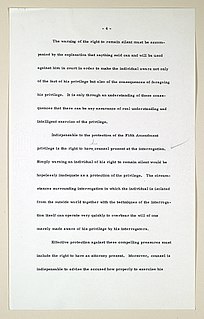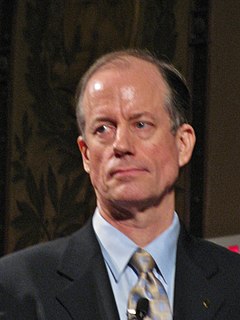Related Research Articles

In the United States, the Miranda warning is a type of notification customarily given by police to criminal suspects in police custody advising them of their right to silence; that is, their right to refuse to answer questions or provide information to law enforcement or other officials. These rights are often referred to as Miranda rights. The purpose of such notification is to preserve the admissibility of their statements made during custodial interrogation in later criminal proceedings.

The Sixth Amendment to the United States Constitution sets forth rights related to criminal prosecutions. It was ratified in 1791 as part of the United States Bill of Rights. The Supreme Court has applied the protections of this amendment to the states through the Due Process Clause of the Fourteenth Amendment.

The Espionage Act of 1917 is a United States federal law enacted on June 15, 1917, shortly after the United States entered World War I. It has been amended numerous times over the years. It was originally found in Title 50 of the U.S. Code but is now found under Title 18. Specifically, it is 18 U.S.C. ch. 37
The right to silence is a legal principle which guarantees any individual the right to refuse to answer questions from law enforcement officers or court officials. It is a legal right recognized, explicitly or by convention, in many of the world's legal systems.

Jesselyn Radack is an American national security and human rights attorney known for her defense of whistleblowers, journalists, and hacktivists. She graduated from Brown University and Yale Law School and began her career as an Honors Program attorney at the U.S. Department of Justice.

Discovery, in the law of common law jurisdictions, is a pre-trial procedure in a lawsuit in which each party, through the law of civil procedure, can obtain evidence from the other party or parties by means of discovery devices such as interrogatories, requests for production of documents, requests for admissions and depositions. Discovery can be obtained from non-parties using subpoenas. When a discovery request is objected to, the requesting party may seek the assistance of the court by filing a motion to compel discovery.
First adopted in 1975, the Federal Rules of Evidence codify the evidence law that applies in United States federal courts. In addition, many states in the United States have either adopted the Federal Rules of Evidence, with or without local variations, or have revised their own evidence rules or codes to at least partially follow the federal rules.
United States v. Reynolds, 345 U.S. 1 (1953), is a landmark legal case in 1953 that saw the formal recognition of the state secrets privilege, a judicially recognized extension of presidential power.
The law of evidence, also known as the rules of evidence, encompasses the rules and legal principles that govern the proof of facts in a legal proceeding. These rules determine what evidence must or must not be considered by the trier of fact in reaching its decision. The trier of fact is a judge in bench trials, or the jury in any cases involving a jury. The law of evidence is also concerned with the quantum (amount), quality, and type of proof needed to prevail in litigation. The rules vary depending upon whether the venue is a criminal court, civil court, or family court, and they vary by jurisdiction.
The Lawrence Franklin espionage scandal involved Lawrence Franklin passing classified documents regarding United States policy towards Iran to Israel. Franklin, a former United States Department of Defense employee, pleaded guilty to several espionage-related charges and was sentenced in January 2006 to nearly 13 years of prison, which was later reduced to ten months' house arrest. Franklin passed information to American Israel Public Affairs Committee policy director Steven Rosen and AIPAC senior Iran analyst Keith Weissman, who later were fired by AIPAC. They were later indicted for illegally conspiring to gather and disclose classified national security information to Israel. However, prosecutors later dropped all charges against them without any plea bargain.
The Confrontation Clause of the Sixth Amendment to the United States Constitution provides that "in all criminal prosecutions, the accused shall enjoy the right…to be confronted with the witnesses against him." The right only applies to criminal prosecutions, not civil cases or other proceedings. Generally, the right is to have a face-to-face confrontation with witnesses who are offering testimonial evidence against the accused in the form of cross-examination during a trial. The Fourteenth Amendment makes the right to confrontation applicable to the states and not just the federal government.
Steven J. Rosen served for 23 years as one of the top officials of the American Israel Public Affairs Committee (AIPAC). He is often singled out in writings about AIPAC.
Graymail is the threatened revelation of state secrets in order to manipulate legal proceedings. It is distinct from blackmail, which may include threats of revelation against, and manipulation of, any private individual. Graymail is used as a defense tactic, forcing the government to drop a case to avoid revealing national secrets.
Thomas Selby Ellis III is a Senior United States District Judge of the United States District Court for the Eastern District of Virginia, appointed by Ronald Reagan.
Public trial or open trial is a trial that is open to the public, as opposed to a secret trial. It should not be confused with a show trial.

The Fifth Amendment to the United States Constitution addresses criminal procedure and other aspects of the Constitution. It was ratified, along with nine other articles, in 1791 as part of the Bill of Rights. The Fifth Amendment applies to every level of the government, including the federal, state, and local levels, in regard to a US citizen or resident of the US. The Supreme Court furthered the protections of this amendment through the Due Process Clause of the Fourteenth Amendment.

The Classified Information Procedures Act or CIPA is codified as the third appendix to Title 18 of the U.S. Code, the title concerning crimes and criminal procedures. The U.S. Code citation is 18 U.S.C. App. III. Sections 1-16.

Thomas Andrews Drake is a former senior executive of the National Security Agency (NSA), a decorated United States Air Force and United States Navy veteran, and a whistleblower. In 2010, the government alleged that Drake mishandled documents, one of the few such Espionage Act cases in U.S. history. Drake's defenders claim that he was instead being persecuted for challenging the Trailblazer Project. He is the 2011 recipient of the Ridenhour Prize for Truth-Telling and co-recipient of the Sam Adams Associates for Integrity in Intelligence (SAAII) award.
Berghuis v. Thompkins, 560 U.S. 370 (2010), is a landmark decision by the Supreme Court of the United States in which the Court considered the position of a suspect who understands their right to remain silent under Miranda v. Arizona and is aware that they have the right to remain silent, but does not explicitly invoke or waive the right.
United States v. Franklin, Rosen, and Weissman was an early 21st century court case from the United States District Court for the Eastern District of Virginia. The government prosecuted one Department of Defense employee (Franklin) and two lobbyists for the American Israel Public Affairs Committee (AIPAC) for allegedly disclosing national defense information to persons 'not entitled' to have it, a crime under the Espionage Act of 1917. It is one of the few Espionage Act cases of its kind, targeted not at traditional espionage or sedition, but at the practice of information leaking in Washington DC. The cases against Rosen and Weissman were also unusual because this aspect of the Espionage act had rarely been used against non-government individuals. Franklin pleaded guilty, but all charges against Rosen and Weissman were dropped.
References
- 1 2 3 4 5 6 7 8 9 10 11 Johnathan M. Lamb, Pepperdine Law Review, Vol. 36, p. 213 (2008). "The Muted Rise of the Silent Witness Rule in National Security Litigation". ssrn.com. SSRN 1125459.
{{cite web}}: Missing or empty|url=(help)CS1 maint: multiple names: authors list (link) - 1 2 US district court for the Eastern district of Virginia. (2002). "GOVERNMENT'S DESIGNATION OF CLASSIFIED DOCUMENTS, US v. Lindh" (PDF). Retrieved 2011-04-12.
- ↑ Barbara Hollingsworth (2011-03-23). "Baltimore jurors might need secret decoders" . Retrieved 2011-04-11.
- ↑ Edward C. Liu & Todd Garvey, CRS (2011-03-31). "Protecting Classified Information and the Rights of Criminal Defendants: The Classified Information Procedures Act" (PDF). Federation of American Scientists . Retrieved 2011-04-14.
- ↑ Tricia Bishop (2011-03-10). "Prosecutors in NSA case want to use code in court". Baltimore Sun. Retrieved 2011-04-13.
- ↑ Jesselyn Radack (2011-03-11). "Kafka Govt Tries Barring Newspaper Articles, Whistleblowing, Over-Classification at Drake Trial". DailyKos. Retrieved 2011-04-13.
- ↑ Josh Gerstein (Mar 10, 2011). "DoJ to use secret code in leak trial". Politico. Archived from the original on 2011-03-14. Retrieved 2013-06-03.
{{cite web}}: CS1 maint: bot: original URL status unknown (link)